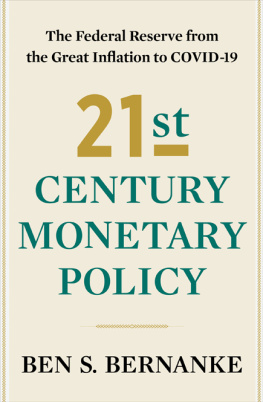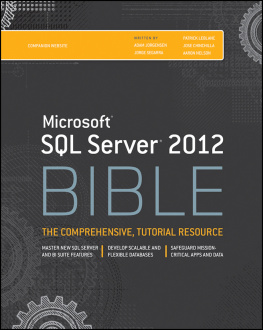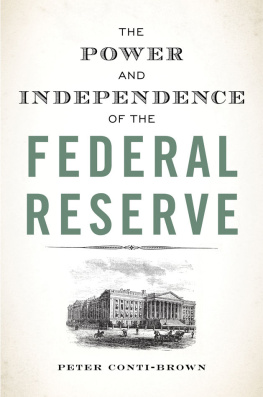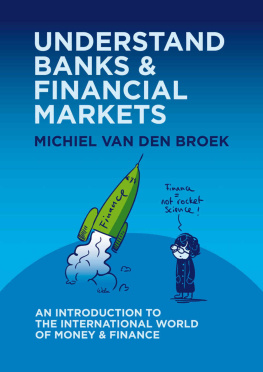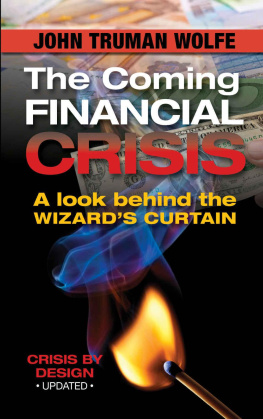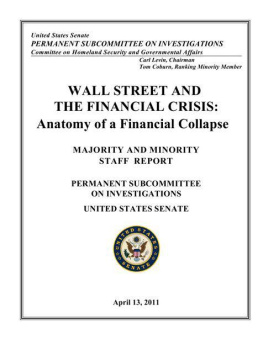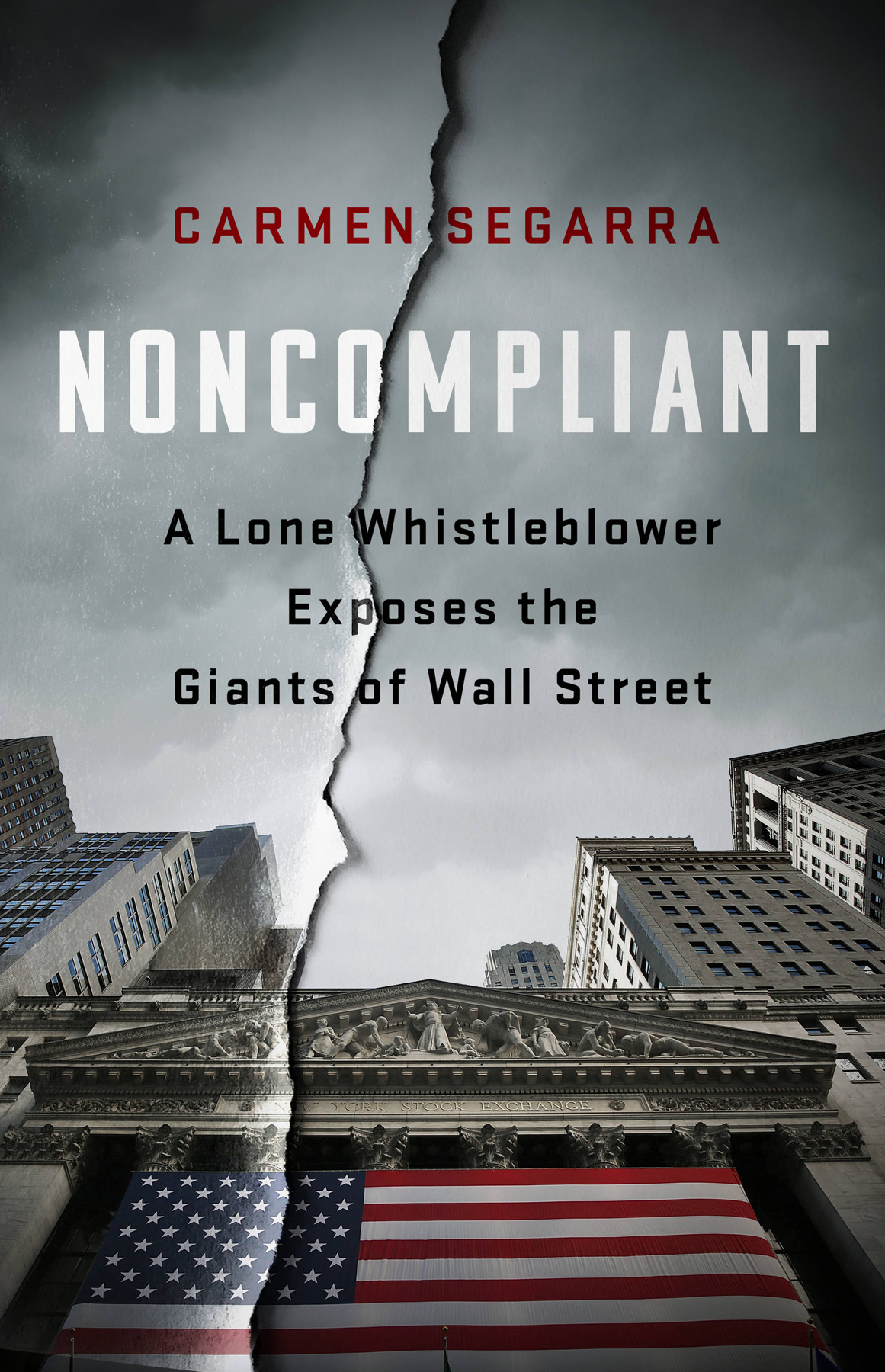The names of some of the actors in this story have been changed, because this book is not about their individual actions, but about an institutional culture at the New York Federal Reserve Bank that has subverted its regulatory mission.
Copyright 2018 by Carmen Segarra
Hachette Book Group supports the right to free expression and the value of copyright. The purpose of copyright is to encourage writers and artists to produce the creative works that enrich our culture.
The scanning, uploading, and distribution of this book without permission is a theft of the authors intellectual property. If you would like permission to use material from the book (other than for review purposes), please contact permissions@hbgusa.com. Thank you for your support of the authors rights.
Bold Type Books
116 East 16th Street, 8th Floor New York, NY 10003
www.boldtypebooks.org
@BoldTypeBooks
First Edition: October 2018
Published by Bold Type Books, an imprint of Perseus Books, LLC, a subsidiary of Hachette Book Group, Inc. Bold Type Books is a co-publishing venture of the Type Media Center and Perseus Books.
The Hachette Speakers Bureau provides a wide range of authors for speaking events. To find out more, go to www.hachettespeakersbureau.com or call (866) 376-6591.
The publisher is not responsible for websites (or their content) that are not owned by the publisher.
Editorial production by Christine Marra, Marrathon Production Services.
www.marrathoneditorial.org
Library of Congress Cataloging-in-Publication Data has been applied for.
ISBN 978-1-56858-845-2 (hardcover), ISBN 978-1-56858-851-3 (ebook)
E3-20190110-JV-PC-COR
For my husband, my guardian angel, the Allies, and St. Judea promise kept
All we have to decide is what to do with the time that is given us.
J.R.R. TOLKIEN , Fellowship of the Ring
Children say that people are hung sometimes for speaking the truth.
JOAN OF ARC


But, given the long list of supervisory failures at the New York Fed, both before and during your tenure as president, would you say that the New York Fed has its own cultural problems? asked Senator Elizabeth Warren, facing the audience from her seat behind the raised semicircular podium.
Well, first, I would not accept the premise that there has been a long list of failures by the New York Fed since my tenure, replied New York Fed president Bill Dudley, clearly ruffled by the question. A few feet in front of him a TV camera, encased in a wooden box, captured his sweating face.
I have to stop you there, Mr. Dudley. That is part of why we called this hearing, is the evidence of the failures at the Fed. So are you saying that these are not true? I mean, are you denying the facts that have already been reported and established about this? Warren retorted.
Well, first of all, I am not clear that there are facts. Dudley answered.
I gripped the pen as tightly as I could, struggling to keep my composure.
Earlier that morning I had been the first to line up outside the door of Room SD-538 at the Dirksen Senate Office Building in Washington, DC. Nothing, I had promised myself, was going to prevent me from sitting in that room and witnessing Dudleys testimony.
As soon as he had taken his seat, photographers had moved into the empty space between the testimony table and the Senate podium. The I had carefully chosen a seat there, with a clear view of Dudleys back and the right side of his face.
As the hearing began, Senator Sherrod Brown had wasted no time laying down the stakes in his opening statement: With all of its resources and its new authority, is the Federal Reserve up to the task of regulating financial institutions that are so large and complex? That is the question. Or, are these Wall Street banks simply too big to regulate?
I watched Dudleys trembling hand reach for a glass of water. Good, I thought. I bit back a smile and did my best to keep a straight face. I have never been good at keeping a poker facebut on this day I did my best to give nothing away. I must admit I was happy. He deserves to be nervous. Not a noble sentiment but, after all I had been through the past three years, a human one.
We are here today because of issues raised by Carmen Segarra. She has done Brown stopped reading from his prepared statement, lifted his head, and looked briefly in my direction, and she is here today, welcomeand she has done a public service in bringing them to light.
At the sound of my name my heart skipped a beat. Time slowed down, and I felt all eyes in the room turn toward me. I was not nervousquite the contrary. I had deliberately worn a red jacket, the better to stand out in that sea of men wearing dark suits. I sat just a little bit straighter and kept my eyes glued on Dudley. He shifted uncomfortably in his seat.
The Federal Reserve is tasked with supervising the nations largest banks and is our first line of defense against another financial crisis. Yet we have seen time and again the Fed has failed to strike the proper balance when regulating these large firms. The most obvious example is the 2008 financial crisis, from which we are still recovering. Their inability to properly regulate the banks led to an economic catastrophe, intoned Senator Joe Manchin.
Coughing and the clicking of cameras occasionally interrupted Senator Manchins words. Dudley sat silently at the witness table, hands crossed. To his left and right two wooden tables were packed with journalists, furiously tapping away on their laptops.
As Senator Warren and I have said, the stakes could not be higher. With the proper supervision, Manchins voice rose slightly and his right hand gestured in the air, we might have averted the 2008 crisis that cost so many people on Main Street in America their jobs and wiped out over a decade of economic success.
Then, as Senator Warren began her opening statement, Dudley again shifted uncomfortably and, this time, clenched his hands. We need bank regulators who work to protect the American people, not the profits of giant banks, and that is what this hearing is about today, she said.
As Dudley began his prepared testimony, I wondered how he would respond to New York Fed officials allegations of misconduct. A small part of me still could not believe what I had witnessed, recorded, and brought to light. It all felt like a lifetime ago.
T HREE YEARS BEFORE this hearing the New York Fed had hired me as an expert in legal and compliance to help supervise some of the nations largest banks. I took the job thinking I would be protecting the safety and soundness of the financial system on behalf of the taxpayers who paid my salary.
Before joining the New York Fed I had been a lawyer deep in the trenches of some of the worlds biggest banks: MBNA America Bank (now part of Bank of America), Citigroup, Socit Gnrale. Many other large banksJPMorgan Chase, UBS, Barclays, Morgan Stanley, Merrill Lynch, Goldman Sachshave interviewed and courted me countless times. I had been sent to many places around the globe, responsible for implementing regulations whose impact went far beyond American shores. I worked with many different kinds of peoplecompetent, high strung, difficult, lazy, friendly, passive-aggressive, clueless, arrogant, forgetful, and too smart for their own gooddiscouraging many from engaging in foolish and risky behavior and even managing to stop a few from breaking the law.



